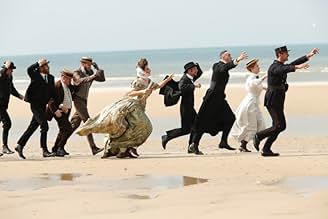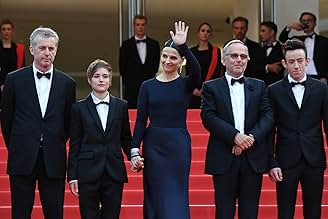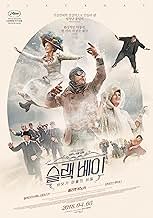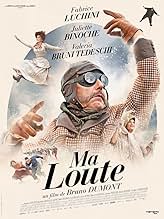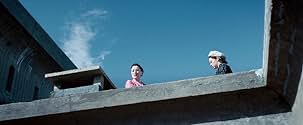CALIFICACIÓN DE IMDb
6.0/10
5 k
TU CALIFICACIÓN
Agrega una trama en tu idiomaIn the early 20th century, at the Pas de Calais, people mysteriously disappear as Ma Loute, son of the local fishermen family, and Billie, daughter of the snobbish Van Peteghems, fall in lov... Leer todoIn the early 20th century, at the Pas de Calais, people mysteriously disappear as Ma Loute, son of the local fishermen family, and Billie, daughter of the snobbish Van Peteghems, fall in love each other.In the early 20th century, at the Pas de Calais, people mysteriously disappear as Ma Loute, son of the local fishermen family, and Billie, daughter of the snobbish Van Peteghems, fall in love each other.
- Premios
- 5 premios ganados y 17 nominaciones en total
Opiniones destacadas
I've not seen any other films by Bruno Dumont, so I don't know how typical this is, but it's the strangest film I've seen for a while.
Whether one finds it funny or not I guess will be down to personal taste, but mostly I found the quiet humour to be appropriate to the style, with only Binoche's over-the-top performance striking a jarring note. Many of the cast (the fat detective in particular) were clearly having a great time, and the mix of serious issues and disparate characters worked well for me.
The cinematography was also great and, although there were many loose ends and perhaps 20-30 minutes too much in the running time, there was enough plot and a fairly satisfying resolution. Just go with it.
Whether one finds it funny or not I guess will be down to personal taste, but mostly I found the quiet humour to be appropriate to the style, with only Binoche's over-the-top performance striking a jarring note. Many of the cast (the fat detective in particular) were clearly having a great time, and the mix of serious issues and disparate characters worked well for me.
The cinematography was also great and, although there were many loose ends and perhaps 20-30 minutes too much in the running time, there was enough plot and a fairly satisfying resolution. Just go with it.
Only French can do a movie like this !
Cast is brilliant !
It's a dark comedy, quite absurd and... very different !
The locations are a magnificent part of France !
Cast is brilliant !
It's a dark comedy, quite absurd and... very different !
The locations are a magnificent part of France !
Anyone who doubted that Bruno Dumont could do comedy might have been surprised by "P'tit Quinquin" which was weirdly funny, surreal and highly imaginative. However, if you skipped "P'tit Quinquin" and have come straight to "Slack Bay", then your doubts will have been confirmed for this bit of slapstick is about as funny as an appendectomy. The setting is the Northern French coast in the summer of 1910 and follows the far-from-hilarious exploits of three sets of characters; a well-to-to family, there on vacation, a local family of muscle-gatherers and a couple of policemen, one very large and fat, the other small and thin, there to investigate some mysterious disappearances.
The policemen are obviously based on Laurel and Hardy, though it's unlikely this pair will raise a smile let alone a laugh. Dumont's idea of comedy is to have most of his characters fall down at regular intervals though some do take to levitating by the time the film is over. There is, of course, a sicker and more Dumontesque sensibility at work here, since the muscle-gatherers are also a family of cannibals, ('Anyone want more foot', says the mother to her sons), who are killing off the tourists and eating them.
The star, for want of a better word, of this rubbish is Juliette Binoche, cast as a comic grande-dame. At least she aligns herself with Dumont's vision which, in this case, isn't saying much. Visually the film is very beautiful and like "P'tit Quinquin" is weird enough not be boring but that is about all you can say in its favour. This one is for Dumont completists only.
The policemen are obviously based on Laurel and Hardy, though it's unlikely this pair will raise a smile let alone a laugh. Dumont's idea of comedy is to have most of his characters fall down at regular intervals though some do take to levitating by the time the film is over. There is, of course, a sicker and more Dumontesque sensibility at work here, since the muscle-gatherers are also a family of cannibals, ('Anyone want more foot', says the mother to her sons), who are killing off the tourists and eating them.
The star, for want of a better word, of this rubbish is Juliette Binoche, cast as a comic grande-dame. At least she aligns herself with Dumont's vision which, in this case, isn't saying much. Visually the film is very beautiful and like "P'tit Quinquin" is weird enough not be boring but that is about all you can say in its favour. This one is for Dumont completists only.
Bruno Dumont made a Bruno Dumont film in his original region with real inhabitants. Like Li'l Quinquin, some actors are amateurs, some are pros, sadly...
There is no real plot here, no story. Just some days in the North of the France in the 1910's. There are some poetry, comedy, but all of the film is made by the situation of the actors, amateur or pro. The professional are to overdo : Binoche and Luchini are sometimes good, often to much, and so bad... The amateurs voices are always hard to understand, even if your are french. Maybe with the subtitle will be better.
I like this film, the photo are not so good (first film for the director in digital) the colors are usually blurry. There is no real story, the actors are inaudible or to overdo, it's hard to understand, the end are (for me ) not good... But ... i like it ! It's funny, shabby, unhealthy, beautiful, full of love, with no mockery. The director like is region, the people from there (like the Redneck in the USA) and made fun with their reputations. It's a little jewel of burlesque, like a Belgian film.
It's a unusual film, don't except a traditional thing. Take It As It Comes.
There is no real plot here, no story. Just some days in the North of the France in the 1910's. There are some poetry, comedy, but all of the film is made by the situation of the actors, amateur or pro. The professional are to overdo : Binoche and Luchini are sometimes good, often to much, and so bad... The amateurs voices are always hard to understand, even if your are french. Maybe with the subtitle will be better.
I like this film, the photo are not so good (first film for the director in digital) the colors are usually blurry. There is no real story, the actors are inaudible or to overdo, it's hard to understand, the end are (for me ) not good... But ... i like it ! It's funny, shabby, unhealthy, beautiful, full of love, with no mockery. The director like is region, the people from there (like the Redneck in the USA) and made fun with their reputations. It's a little jewel of burlesque, like a Belgian film.
It's a unusual film, don't except a traditional thing. Take It As It Comes.
The centennial anniversary of the breaking of WWI was an opportunity for several books to be written and films to be made (most of them documentaries) not only about the war itself, but also about the years that preceded it. Those were the finals years of a period that had started at the end of the Franco – Prussian war in 1870 and had seen a period of more than four decades of peace, never encountered in the written history of Europe. For many people living it those times La Belle Epoque seemed to signal an apparent stability based on the balance between the power of a few Empires and Republics. A middle class appeared in Europe allowing for economic development, arts flourished, and life was good for many. Yet, the political tensions were present at the level of the relations between the big powers in Europe, and many of the national societies were sick. Which is exactly the theme of Bruno Dumont's film 'Ma Loute'.
Dumont is one of the masters of a cinema sub-genre which I will call 'films about degenerated people' (or social, or family relations, or a combination of these. Marc Caro and Jean-Pierre Jeunet 's Delicatessen is another example of the genre, so is Dogtooth by Greek director Yorgos Lanthimos. 'Ma Loute' not only takes the genre one step ahead because of the quality of the execution, but also provides political and historical dimensions by locating the story of mysterious disappearances, social conflict between the rich tourists and the poor fishermen and a love story which is impossible for many reasons in a precise place – the North-West of France close to Calais and time – the end of La Belle Epoque.
Viewers should be warned that this is no easy film to watch. 5% of the audience walked out the theater I was in. Among those who stayed I suspect that half disliked what they have seen, with the negative reactions between considering the theme disgusting to ridiculous. The acting style is also very heavily and intentionally exaggerated. It is the description of sick families, of hateful relations between classes, of a non-functional society at all levels. The fact that all these seem to get some rational explanation may satisfy for a moment, but then the film slides in a combination of grotesque and fantastic (the levitation scenes) that is close to genial. Watching fine actors as Fabrice Luchini, Juliette Binoche,or Valeria Bruni Tedeschi is of course a delight but do not expect them to act like in any other movies that you have seen with them in the past. The young couple acted by Brandon Lavieville and Raph both at their first film add some level of innocence, but all is under the sign of the deformed mirrors here.
'Ma Louche' is a very different kind of cinema experience, viewers take risks watching it, and they are rewarded with a surprise which according to taste and approach can be very good or very unpleasant.
Dumont is one of the masters of a cinema sub-genre which I will call 'films about degenerated people' (or social, or family relations, or a combination of these. Marc Caro and Jean-Pierre Jeunet 's Delicatessen is another example of the genre, so is Dogtooth by Greek director Yorgos Lanthimos. 'Ma Loute' not only takes the genre one step ahead because of the quality of the execution, but also provides political and historical dimensions by locating the story of mysterious disappearances, social conflict between the rich tourists and the poor fishermen and a love story which is impossible for many reasons in a precise place – the North-West of France close to Calais and time – the end of La Belle Epoque.
Viewers should be warned that this is no easy film to watch. 5% of the audience walked out the theater I was in. Among those who stayed I suspect that half disliked what they have seen, with the negative reactions between considering the theme disgusting to ridiculous. The acting style is also very heavily and intentionally exaggerated. It is the description of sick families, of hateful relations between classes, of a non-functional society at all levels. The fact that all these seem to get some rational explanation may satisfy for a moment, but then the film slides in a combination of grotesque and fantastic (the levitation scenes) that is close to genial. Watching fine actors as Fabrice Luchini, Juliette Binoche,or Valeria Bruni Tedeschi is of course a delight but do not expect them to act like in any other movies that you have seen with them in the past. The young couple acted by Brandon Lavieville and Raph both at their first film add some level of innocence, but all is under the sign of the deformed mirrors here.
'Ma Louche' is a very different kind of cinema experience, viewers take risks watching it, and they are rewarded with a surprise which according to taste and approach can be very good or very unpleasant.
¿Sabías que…?
- TriviaThe second of Bruno Dumont's films to employ some professional actors rather than only amateurs after Camille Claudel (2013), which already starred Juliette Binoche.
- ConexionesReferenced in Conversations avec... (2018)
- Bandas sonorasBARBERINE: PRELUDE AU 2ème ACTE
Composed by Guillaume Lekeu
Performed by Orchestre Philharmonique de Liège
© Domaine Public
(p) Ricercar / Outhere Music
Selecciones populares
Inicia sesión para calificar y agrega a la lista de videos para obtener recomendaciones personalizadas
- How long is Slack Bay?Con tecnología de Alexa
Detalles
- Fecha de lanzamiento
- Países de origen
- Sitios oficiales
- Idiomas
- También se conoce como
- Slack Bay
- Locaciones de filmación
- Wissant, Pas-de-Calais, Francia(Egyptian villa)
- Productoras
- Ver más créditos de la compañía en IMDbPro
Taquilla
- Presupuesto
- EUR 7,209,690 (estimado)
- Total en EE. UU. y Canadá
- USD 112,621
- Total a nivel mundial
- USD 4,925,446
- Tiempo de ejecución2 horas 2 minutos
- Color
- Relación de aspecto
- 2.35 : 1
Contribuir a esta página
Sugiere una edición o agrega el contenido que falta

Principales brechas de datos
By what name was La alta sociedad (2016) officially released in India in English?
Responda
![Ver Bande-Annonce [VO]](https://m.media-amazon.com/images/M/MV5BMmRjYmFlNjUtMzE4Mi00ZjM5LTgyYzItNTQ0OWFlNDNhZGNjXkEyXkFqcGdeQXRyYW5zY29kZS13b3JrZmxvdw@@._V1_QL75_UX500_CR0)

